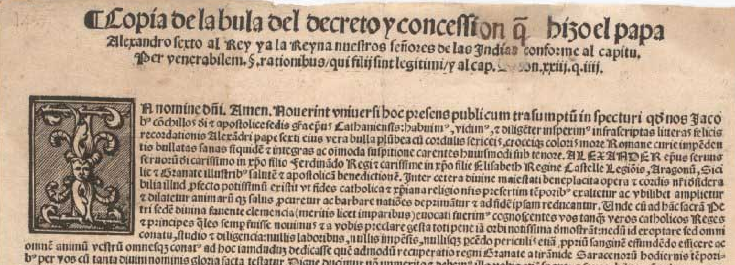The Doctrine of Discovery: On This Day, 1493
Posted by Anna Khomina on Thursday, 05/04/2017
In October 1492, Christopher Columbus landed on a Caribbean island he called San Salvador and claimed it for the king and queen of Spain. A few months later, on May 4, 1493, Pope Alexander VI issued a papal bull known as "Inter Caetera," which played a central role in establishing and protecting Spanish domination over land on the west side of the Atlantic. The bull demarcated a line 350 miles west of the Azores and Cape Verde Islands and assigned Spain the exclusive right to acquire territorial possessions and to trade west of that line. All others were forbidden to approach these lands without special license from the Spanish rulers.

Portugal quickly protested this apparent violation of previous bulls issued in its favor, and Spain and Portugal negotiated the Treaty of Tordesillas in 1494, which effectively propelled them to superpower status at the turn of the century. However, this protection only went so far, as within the next century, the English, Dutch, and French established their own trade routes and colonies around the world.
Inter Caetera also imbued Spanish conquests with a holy mission: spreading Christianity. The pope stated that any land not inhabited by Christians was available to be "discovered," claimed, and exploited by Christian rulers and declared that "the Catholic faith and the Christian religion be exalted and be everywhere increased and spread, that the health of souls be cared for and that barbarous nations be overthrown and brought to the faith itself."
Read the entire papal bull in English here.
View essays, videos, and primary sources on the Age of Exploration here.